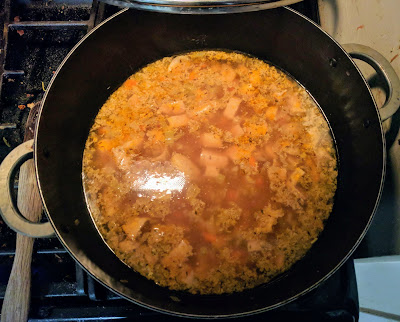Rosemary Bread
This is more of an idea than a recipe. The idea being that you can add rosemary to your favourite yeasted bread to turn it into savoury rosemary bread.
The rosemary comes through particularly well in a white bread, but I quite enjoy in in a whole wheat loaf as well. Of course, you could combine the two for a light, semi-whole wheat loaf.
I don't recommend trying to make this one with rye or buckwheat flour as their flavours are too strong and will overpower the rosemary rather than complementing it.
Most Tyrians make this as a fairly plain, lean loaf with just flour, water, salt, yeast, and rosemary. That said, if you feel like something with an even more assertive flavour, I can heartily recommend adding some minced garlic and a bit of garlic-infused oil to the dough. This produces a wonderful, fragrant loaf with a great herb-and-garlic flavour.
I actually made this as a sourdough loaf. But it could easily be done using commercial yeast either as well as or instead of the starter.
(I unfortunately overproofed my dough. So these loaves came out much flatter and denser than they should have.)
The rosemary comes through particularly well in a white bread, but I quite enjoy in in a whole wheat loaf as well. Of course, you could combine the two for a light, semi-whole wheat loaf.
I don't recommend trying to make this one with rye or buckwheat flour as their flavours are too strong and will overpower the rosemary rather than complementing it.
Most Tyrians make this as a fairly plain, lean loaf with just flour, water, salt, yeast, and rosemary. That said, if you feel like something with an even more assertive flavour, I can heartily recommend adding some minced garlic and a bit of garlic-infused oil to the dough. This produces a wonderful, fragrant loaf with a great herb-and-garlic flavour.
I actually made this as a sourdough loaf. But it could easily be done using commercial yeast either as well as or instead of the starter.
(I unfortunately overproofed my dough. So these loaves came out much flatter and denser than they should have.)
Rosemary Bread
Ingredients
- 800g hard (strong/high grade/bread) flour (either white or whole wheat)
- 600g water
- 16g coarse sea salt
- 200g sourdough starter @ 100% hydration
- 10-15g fresh rosemary
- 2 1/4 tsp. instant yeast (optional)
- 4-5 cloves garlic, minced (optional)
- 2 Tbsp. garlic-infused oil (optional)
Directions
- Combine the flour and water and mix well.
- Cover and set aside to autolyse for an hour or two.
- Mix in the salt and rosemary followed by the starter and yeast (if using).
- If using garlic, mix it and the oil in now.
- Cover and set aside to rise. Leave for an hour or two if using commercial yeast or 6-8 hours for starter only. Stretch and fold the dough every hor or two if using starter.
- Divide the dough into two equal portions and round each one.
- Cover and rest for 10-20 minutes.
- Meanwhile, flour two bannetons.
- Shape each round into a loaf and place, seam-side-up, into the bannetons.
- Cover and let rise at room temperature for 1-3 hours (depending on whether using commerical yeast or starter) or overnight in the fridge.
- Preheat oven to 230°C (450°F) and put the kettle on to boil.
- Grease a baking sheet and dust it with cornmeal.
- Pour several cups of boiling water into a large pan and place it on the bottom rack of the oven.
- Turn the loaves out onto the prepared pan and slash as desired.
- Bake/steam at 230°C (450°F) for 15 minutes.
- Remove steam tray and reduce oven temperature to 180°C (350°F) for 20 minutes.
- Transfer to wire rack to cool.




Comments
Post a Comment